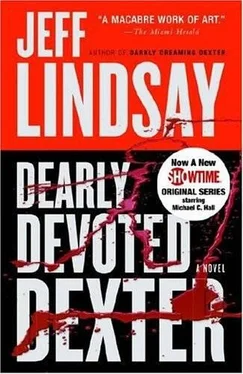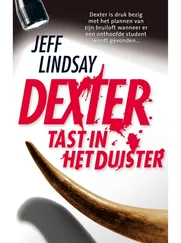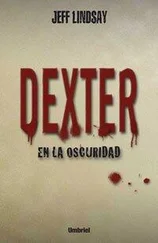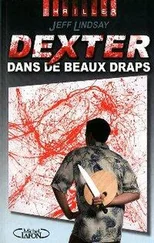Everything on the body had been cut off, absolutely everything. There was nothing left of it but a bare and featureless head attached to an unencumbered body. I could not imagine how it was possible to do this without killing the thing, and it was certainly far beyond me why anyone would want to. It revealed a cruelty that really made one wonder if the universe was such a good idea after all. Pardon me if this sounds a tad hypocritical coming from Death-head Dexter, but I know very well what I am and it is nothing like this. I do what the Dark Passenger deems necessary, to someone who truly deserves it, and it always ends in death-which I am sure the thing on the table would agree was not such a bad thing.
But this-to do all this so patiently and carefully and leave it alive in front of a mirror… I could feel a sense of black wonder drifting up from deep inside, as if for the very first time my Dark Passenger was feeling just a little bit insignificant.
The thing on the table did not appear to register my presence. It just kept making that deranged doggie sound, nonstop, the same horrible wavering note over and over.
I heard Deb scuffle to a halt behind me. “Oh Jesus,” she said. “Oh God… What is it?”
“I don’t know,” I said. “But at least it’s not a dog.”
THERE WAS A VERY QUIET RUSH OF AIR, AND I LOOKED beyond Deborah to see that Sergeant Doakes had arrived. He glanced once around the room and then his eyes settled on the table. I admit that I had been curious to see what his reaction would be to something this extreme, and it was well worth the wait. When Doakes saw the kitchen’s central exhibit his eyes locked onto it and he stopped moving so completely that he could have been a statue. After a long moment he moved toward it, gliding slowly as if pulled on a string. He slid past us without noticing that we were there and came to a stop at the table.
For several seconds he stared down at the thing. Then, still without even blinking, he reached inside his sport coat and drew out his pistol. Slowly, with no expression, he aimed it between the unblinkable eyes of the still-yowling thing on the table. He cocked the pistol.
“Doakes,” said Deborah in a dry croak of a voice, and she cleared her throat and tried again. “Doakes!”
Doakes did not answer nor look away, but he didn’t pull the trigger, which seemed a shame. After all, what were we going to do with this thing? It wasn’t going to tell us who had done this. And I had a feeling its days as a useful member of society had come to an end. Why not let Doakes put it out of its misery? And then Deb and I would reluctantly be compelled to report what Doakes had done, he would be fired and even imprisoned, and my problems would be over. It seemed like such a neat solution, but of course it was not the kind of thing Deborah would ever agree to. She can get so fussy and official at times.
“Put away your weapon, Doakes,” she said, and although the rest of him remained absolutely motionless, he swiveled his head to look at her.
“Only thing to do,” he said. “Believe me.”
Deborah shook her head. “You know you can’t,” she said. They stared at each other for a moment, then his eyes clicked onto me. It was exceptionally hard for me to look back without blurting out something like, “Oh, what the hell-go for it!” But I managed somehow, and Doakes turned the pistol up into the air. He looked back at the thing, shook his head, and put the pistol away. “Shit,” he said. “Shoulda let me.” And he turned, walking rapidly out of the room.
Within the next few minutes the room became crowded with people who tried desperately not to look while they went to work. Camilla Figg, a stocky, short-haired lab tech who had always seemed to be limited in expression to either blushing or staring, was crying quietly as she dusted for fingerprints. Angel Batista, or Angel-no-relation as we called him, since that is how he always introduced himself, turned pale and clamped his jaw tightly shut, but he stayed in the room. Vince Masuoka, a co-worker who normally acted like he was only pretending to be human, trembled so badly he had to go outside and sit on the porch.
I began to wonder if I should pretend to be horrified, too, just to avoid being too noticeable. Perhaps I should go out and sit beside Vince. What did one talk about at such times? Baseball? The weather? Surely one wouldn’t talk about the thing we were running from-and yet, I found to my surprise that I would not mind talking about it. In truth, the thing was beginning to raise a mild twitch of interest from a Certain Interior Party. I had always worked so hard to avoid any kind of notice at all, and here was someone doing just the opposite. Clearly this monster was showing off for some reason, and it may have been only a perfectly natural competitive spirit, but that seemed a little irritating, even while it made me want to know more. Whoever did this was unlike anyone else I had ever encountered. Should I move this anonymous predator onto my list? Or should I pretend to swoon with horror and go sit outside on the porch?
As I pondered this difficult choice, Sergeant Doakes brushed past me again, for once barely even pausing to glower at me, and I recalled that because of him I had no chance to work through a list at the moment. It was mildly disconcerting, but it did make the decision seem a little easier. I started composing a properly unsettled facial expression, but got no further than raising my eyebrows. Two paramedics came rushing in, all focused importance, and stopped dead when they saw the victim. One of them immediately ran from the room. The other, a young black woman, turned to me and said, “What the fuck are we supposed to do?” Then she started crying, too.
You have to agree she had a point. Sergeant Doakes’s solution was starting to look more practical, even elegant. There seemed very little point in whisking this thing onto a gurney and dashing through Miami traffic to deliver it to a hospital. As the young lady had so elegantly put it, what the fuck were they supposed to do? But clearly somebody had to do something. If we just left it there and stood around like this, eventually someone would complain about all the cops throwing up in the yard, which would be very bad for the department’s image.
It was Deborah who finally got things organized. She persuaded the paramedics to sedate the victim and take it away, which allowed the surprisingly squeamish lab techs to come back inside and go to work. The quiet in the little house as the drugs took hold of the thing was close to ecstatic. The paramedics got the thing covered and onto their gurney without dropping it and wheeled it off into the sunset.
And just in time; as the ambulance pulled away from the curb the news trucks started to arrive. In a way it was a shame; I would love to have seen the reaction of one or two of the reporters, Rick Sangre in particular. He had been the area’s leading devotee of “If it bleeds, it leads,” and I had never seen him express any sense of pain or horror, except on camera or if his hair was mussed. But it was not to be. By the time Rick’s cameraman was ready to roll, there was nothing left to see other than the little house fenced in by the yellow tape, and a handful of cops with clamped jaws who wouldn’t have had much to say to Sangre on a good day, and today probably wouldn’t have told him his own name.
There was really not a great deal for me to do. I had come in Deborah’s car and so I did not have my kit, and in any case there was no visible blood spatter anywhere that I could see. Since that was my area of expertise, I felt I should find something and be useful, but our surgical friend had been too careful. Just to be sure I looked through the rest of the house, which wasn’t much. There was one small bedroom, an even smaller bathroom, and a closet. They all seemed to be empty, except for a bare, battered mattress on the floor of the bedroom. It looked like it had come from the same thrift shop as the living-room chair and had been pounded flat like a Cuban steak. No other furniture or utensils, not even a plastic spoon.
Читать дальше












